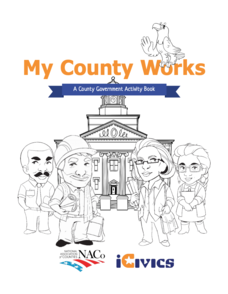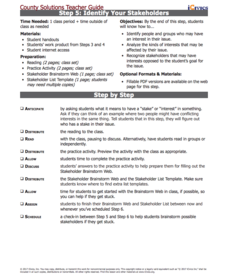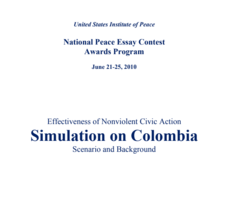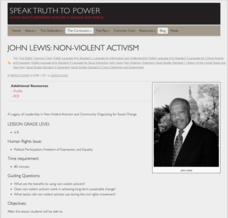Facing History and Ourselves
Free Press Makes Democracy Work
A unit study of the importance of a free press in a democracy begins with class members listening to a podcast featuring two journalists, one from a United States public radio station and one from Capetown, South Africa. The lesson plan,...
College Board
Civic Knowledge and Action in AP U.S. Government and Politics
Vote, it's your civic duty! The high school lesson focuses on voter turnout and civic participation with a series of activities. Young scholars analyze data to discover voter turnout trends, complete worksheets, and participate in group...
PBS
Civic Engagement and How Students Can Get Involved
There is no age limit on civic engagement. Even if your pupils are not old enough to vote, they are old enough to get involved. Show them how with a PBS lesson that underscores the importance of civic participation and models ways young...
PBS
Stereotypes vs. Statistics (Grades 4-8)
Stereotypes can be painful if they are used to discriminate against others. Statistics, however, can be helpful in dispelling myths propagated by stereotypes. Using a thoughtful lesson plan, scholars complete graphic organizers and...
iCivics
Sortify: U.S. Citizenship
What is the difference between a right and a responsibility? Scholars consider the question while sorting characteristics of citizenship into buckets using a video game. After playing, class members see how effectively they sorted the...
iCivics
Responsibility Launcher
So how would pupils solve a town's problems? Using a video game, scholars tell residents of a town how to solve their problems by taking steps such as going back to school, voting, or serving in the military. As they make good choices,...
iCivics
My County Works
A 22-page packet sheds light on the hard work taking place at a county's seat. Scholars read brief informational text and fill in information about their own county workers. Pages take you to a department around the county site each...
iCivics
Step Six: Real World Policies
Sometimes it takes real-world examples to get concepts to click. Use the resource to instruct middle schoolers on the relevancy of public policy in today's world. Exercises include a 5W + H graphic organizer, class discussion, and...
iCivics
Step Four: Working with Websites
Almost every profession today relates to websites in some way! The resource tasks the class to fill out three individual graphic organizers to help them analyze each website they visit.
iCivics
Step Three: Who You Gonna Call?
Problem solving is an essential skill everyone must master. The resource instructs pupils how to analyze different scenarios and decide the best way to solve many different problems that take place in communities. Scholars read, discuss,...
Miama-Dade County Public Schools
Middle School Mock Trial Competition
Objection! Scholars participate in a mock trial to gain an understanding the ins and outs of court procedures. Using the Jessie Jones v. Palm City court case, they role play each specific part of the trial, learning how courts operate...
iCivics
Step 5: Identify Your Stakeholders
Have you ever had a goal, but needed help achieving it? Scholars analyze the purpose of stakeholders in the fifth installment of a 10-part County Solutions - High School series. They investigate finances, personal concerns, geography,...
US Institute of Peace
What Does It Take to Be a Peacebuilder?
Is the spirit of peacebuilding already inside you? Scholars take a closer look at the characteristics of peacebuilders, past and present, in lesson 13 of a 15-part series. Individuals identify common traits of peacebuilders, then work...
US Institute of Peace
Effectiveness of Nonviolent Civic Action Simulation on Colombia
With new leadership comes new hope! After years of violence, the people of Colombia elect a new president ... could this mean an end to conflict? Civics scholars take part in a large group role-playing exercise designed to illustrate the...
US Institute of Peace
Becoming a Peacebuilder
"Be the change you wish to see in the world!" The 15th and final lesson in a peacebuilding series uses this quote from Gandhi to prepare pupils for their own action projects. Individuals research a global issue, then brainstorm a method...
US Institute of Peace
Organizations Working for Peace
From helping refugees to negotiating peace treaties, the peacekeepers of the world keep busy! Introduce young activists to the many individuals and organizations throughout the world that work daily toward peace. 14th in a series of 15...
US Institute of Peace
Taking a Step Toward Peacebuilding
What can someone do to increase the peace? Pupils take small steps toward a big peacebuilding role in the final lesson plan in a 15-part unit. Individuals identify their roles as a peacebuilder and create a stepping stone that reflects...
John F. Kennedy Presidential Library & Museum
Ask Not What Your Country Can Do for You
Ask not what the lesson here can do for you, but what you can do with the lesson. The answer is quite a lot! Young scholars revisit JFK's famous inaugural address with a focus on his plea for civic engagement. There's a letter to JFK...
Curated OER
Print & Go ESL
Improve reading comprehension with a set of ESL worksheets. Kids read through various passages, note which facts are true or false, mark their opinion on two statements, and write a short reply based on a writing prompt.
National Endowment for the Humanities
Using Historic Digital Newspapers for National History Day
Your learners will take a trip through history as they peruse through historic digitalized newspapers, reading real articles from such historical periods in the United States as the Temperance movement and passage of the Thirteenth...
Curated OER
Lesson 4: The Judiciary: A Brief Introduction to the Courts System
Focusing on the judicial branch of government, the fourth lesson in this series explores the structure of the US courts system. Beginning with an engaging activity based on the short story The Lady or the Tiger, students go on to examine...
Center for Civic Education
Citizenship Schools and Civic Education During the Civil Rights Movement and in the Present
Your young historians will discover the importance that citizenship education has played in the social progress of the United States as they learn about early efforts to discourage African Americans from voting in the 1960s.
Speak Truth to Power
John Lewis: Non-Violent Activism
After comparing and contrasting non-violent and violent social movements, your young historians will take a closer look at the work and influence of John Lewis on the civil rights movement. They will then choose a current social justice...
Student Handouts
Constitutional Principles
Keep track of constitutional principles with a graphic organizer. Pupils define, describe the origins of, and note down the location of the following terms: checks and balances, federalism, individual rights, limited government, popular...

























